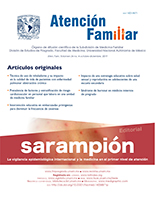Burnout Syndrome in Undergraduate Medical Interns
Main Article Content
Abstract
Objective: to estimate prevalence and identify the factors associated with burnout syndrome in undergraduate medical interns (umi). Methods: cross-sectional and analytical study, carried out between December 2016 and January 2017. 108 undergraduate medical interns (umi) participated from the Regional General Hospital Vicente Guerrero no. 1 of the Mexican Institute of Social Security (imss), in Acapulco, Guerrero, Mexico. A sociodemographic card and the Maslach Burnout Inventory instrument were applied, which evaluates three aspects: emotional exhaustion, depersonalization and low personal fulfilment. Simple frequency analysis and bivariate analysis were performed. Results: the global prevalence of burnout was 17.5% (n=19), no case was found among new medical interns, in 42 undergraduate medical interns working for six months the finding was 17% (n= 7) and in 28 medical interns working for twelve months burnout syndrome was diagnosed in 43% (n= 12). The main associated risk factor was rotation to the emergency room (or: 5.4). Conclusions: as time progresses the prevalence of burnout syndrome increases. Strategies are needed to reduce the identified problem.
